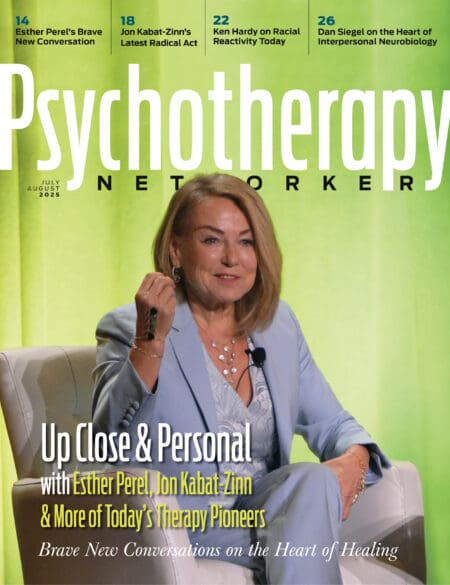Enjoy the audio preview version of this article—perfect for listening on the go.
Most traditional training programs emphasize that there are two paramount taboos in therapy: self-disclosure and giving advice. As the argument goes, therapist self-disclosure destroys the blank slate and turns the focus away from clients’ issues, and giving advice interferes with helping clients learn to solve their own problems. Yet one of our profession’s newest, most popular voices specializes in violating both of those taboos.
Lori Gottlieb, who pens the “Dear Therapist” column for The Atlantic, has written a trio of self-disclosing books: Stick Figure, centered on her teenage eating disorder; Marry Him, a controversial look at “settling” for a marriage partner; and the newly released Maybe You Should Talk to Someone: A Therapist, Her Therapist, and Our Lives Revealed—bestsellers all. In fact, the legendary Irvin Yalom lavishly praised her latest work for being “so bold and brassy, so packed with good stories, so honest, deep, and riveting.”
A licensed marriage and family therapist educated at Yale and Stanford, Gottlieb manages to remain engaged in her clinical practice even as she’s attracting a growing audience with her books. I was fortunate to catch up with her just before her latest one hit the shelves.
RH: How did you start the “Dear Therapist” column in The Atlantic?
Gottlieb: I’ve always wanted to bring therapy to a wider group of people, and I’d been working for The Atlantic for years as a contributing editor. They were starting a new family section, and we were talking about how I could bring to a general audience the issues, dilemmas, and insights that emerge in my work with clients. We didn’t want to do an advice column per se, because lots of great ones are out there already. “Dear Therapist” is kind of a hybrid. I’m partly giving advice, but mostly I’m doing what I do in the therapy room, which is telling people to try looking at something in a different way, shifting their perspective on it. So rather than saying, “No, don’t talk to your mother-in-law!” it’s “Here’s what your mother-in-law might be thinking.”
RH: As therapists, giving advice is kind of a dicey topic. We’re not supposed to make decisions for people or live their lives for them.
Gottlieb: Right. What I try to do is help people zoom out and see the broader picture. Most people are writing in because they’re having a struggle with someone. So I want them to look inside themselves and imagine what the other person’s viewpoint might be. I think whatever idea they have about the problem will shift if they can widen their perspective, especially if they see how they might be contributing to it.
RH: How do you get around the legal and ethical issues of talking about a person’s real problem with confidentiality and without signing a consent form?
Gottlieb: This column is not therapy. When you submit a letter, you have to check a box that says you understand that. I can’t do therapy with people I’ve never met, without knowing anything about them. I’m using my training to help them look at a situation differently, but that’s different from sitting face to face with someone and trying to help them change. People who write into my column are voluntarily sending letters for publication.
RH: Is it a challenge to give your viewpoint as a therapist while being limited to the subjective information that the letter writer gives you?
Gottlieb: One of the things I talk about in the new book is how when clients come in, I’m not just listening to their story: I’m listening to how flexible they are with it. I have no way of asking questions of the letter writer, so of course I’m getting a very specific version of the story. That’s why, in all the columns, I’m saying I want you to consider the other person’s experience.
Most people writing in are gunning for me to side with them. They’re essentially saying, “Tell me that my husband is being a jerk,” or “Tell me that I’m right in this situation.” They want me to tell them they’re not crazy—and they’re not. They’re just stuck in a rigid version of a story. I know that they’re choosing how to frame that story—and I go with that, but I also say that x, y, or z might also be going on.
RH: Are your thoughts and opinions in your column and book informed by any particular psychological theories?
Gottlieb: I’m very relational in how I work. I look at attachment and how people relate globally, not just with a specific problem they brought in, but where else they might be getting stuck and shooting themselves in the foot without realizing it. I think a lot about family systems, and I do a lot in the room with what’s going on between me and the client.
RH: In Maybe You Should Talk to Someone, you write about your own treatment with your therapist, as well as your experience with some of your clients. What was it like to be so self-revealing?
Gottlieb: It’s funny because when I told people who aren’t therapists what I was doing in this book, they were intrigued. But when I told therapists, their first reaction was like, “What? You’re doing what?” As the writer, I could decide how open I was going to be, and I felt it would be disingenuous if I didn’t show the full scope of my own struggles. If I was going to show the clients in all their humanity, I had to reveal myself in that way, too.
The clients I follow throughout the chapters are very different people. They have different genders, ages, problems, backgrounds, relational patterns. And yet they all have commonalities, not only with each other, but also with me—basic questions about love, loss, mortality, meaning, needs, desire, loneliness. We all ask these questions, whether we’re in therapy or not. My editor likes to say that all the stories in the book are in conversation with one another. And I like to think that every person’s story in the book is in conversation with everyone else’s story in the world.
RH: I’m still surprised when I hear about therapists who are reluctant or too proud to go to therapy. How important is your own treatment to the work that you do with your clients?
Gottlieb: It’s invaluable. I think it’s really hard to understand what the experience is like without doing it: sharing your most intimate inner life with a person you don’t really know. I went though this with my therapist in the book. I wanted him to like me the best. I’d see other people in the waiting room and think, What’s she here for? Does he laugh at her jokes? Even though your therapist doesn’t want you to be “on,” there’s a natural instinct to want that person to enjoy your company. It’s everything I see my clients going through with me.
Why are my clients Googling me? Well, for the same reason that I ended up Googling my therapist one night. I wondered about his life. I thought I wanted that information. There was nothing particularly unusual about what I discovered, but I did learn that his father had died at a fairly young age. I’d been talking in therapy about my close relationship with my father and my worries about his health. Then I started editing myself, because I didn’t want my therapist to feel bad that I have this time with my father before he dies, and he didn’t have that.
These kinds of nuances are hard to imagine until you’re the client. There was a session where I just cried and cried and cried, and I wondered, Is he bored? What’s he thinking? People talk about how hard it is to be a therapist. It’s doubly hard to be in therapy. I have renewed appreciation for that.
RH: What were you aiming to accomplish with this book?
Gottlieb: I was trying to offer an inside look at the way therapists think. I want readers to see how the mind works as they’re going through the stories. So I throw in a lot of psychoeducation—about attachment theory, neuroscience, even social psychology—and try to teach them how to shine a light on their blind spots. I think the response has been that people are seeing themselves in a different way. It’s more than a bunch of stories. It’s a memoir of my experience as both therapist and client—and teacher. I don’t say everybody should go to therapy, but it’s great when people suddenly become curious about themselves.
RH: You’re pulling back the curtain on therapy in a way?
Gottlieb: Right. At one point, I describe a client who really feels that I’m useless, and she’s not shy about telling me that. I tried everything to understand her experience, to understand what’s going on in the room between us. I tried all the suggestions my consultation group offered, but nothing helped me make headway with her. Eventually—I’d never done this before, and I’ve never done it since—I ended my sessions with her, because I felt like I was wasting her time. I had a lot of compassion for her, and I was reluctant to let her go, because I didn’t want her to feel abandoned, but I felt like it was unethical to keep seeing her after such a long period of time with no progress. I thought maybe another therapist could do better.
RH: What is it that you’re hoping therapists can take from this?
Gottlieb: Even if you have a good consultation group, therapy is a solitary profession. So I hope the book helps therapists feel less alone and recognize that we all make mistakes, have uncharitable thoughts, get especially invested in certain clients. I think lots of therapists have been in the types of situations I write about in the book, and I want them to feel it’s okay to share our vulnerabilities and blind spots. Also, maybe people can learn from my experiences, my mistakes. You don’t often get to peer in on another therapist’s sessions, but doing that might spark ideas for how to do things differently in your own practice.
RH: In some ways, therapy is a mysterious profession. Everything happens behind closed doors, and we’re all professional secret keepers.
Gottlieb: I write about how it’s almost like being in the CIA. When you run into clients, you can’t acknowledge them. You’re always holding secrets. Even when you come home to your family, and everyone’s talking about their days, you can’t really tell them about yours.
Even though we’re people who are inherently interested in the human condition, we rarely get to talk about the emotional side of being a therapist. My book is an effort to reveal what it’s like for me going through my own crisis and having to show up for my clients as a professional, despite what’s going on in my own life. I know every therapist can relate to that.
Want to earn CE hours for reading this? Take the Networker CE Quiz.
Ryan Howes
Ryan Howes, Ph.D., ABPP is a Pasadena, California-based psychologist, musician, and author of the “Mental Health Journal for Men.” Learn more at ryanhowes.net.
Lori Gottlieb
Lori Gottlieb is a psychotherapist and New York Times bestselling author of Maybe You Should Talk to Someone, which has sold over a million copies and is currently being adapted as a television series. In addition to her clinical practice, she is co-host of the popular “Dear Therapists” podcast produced by Katie Couric and writes The Atlantic’s weekly “Dear Therapist” advice column. She is a sought-after expert in media such as The Today Show, Good Morning America, CBS This Morning, CNN, and NPR’s “Fresh Air” and her recent TED Talk was one of the Top 10 Most Watched of the Year. She is also the creator of the brand new Maybe You Should Talk To Someone Workbook: A Toolkit for Editing Your Story and Changing Your Life. Learn more at LoriGottlieb.com.














